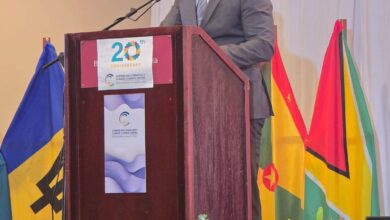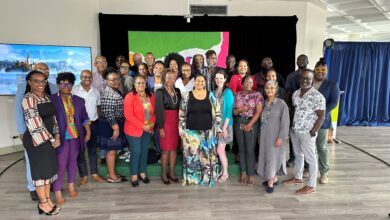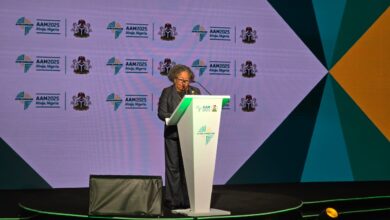Deputy Prime Minister of St. Kitts and Nevis and Incoming Chairman of the Council for Trade and Economic Development (COTED), Hon. Sam Condor;
Minister of Agriculture, Housing, Lands and the Environment of Montserrat and Outgoing Chairman of the Coted, Hon. Margaret Dyer-Howe;
Minister of Foreign Trade and International Cooperation of Guyana and Host Minister, Hon. Clement Rohee;
Deputy Prime Ministers;
Ministers;
Representatives of Member States and Regional Representatives of International, Hemispheric and Regional Organisations of the Public and Private Sector;
Director-general and Experts of the Regional Negotiating Machinery, Dr. Richard Bernal;
Members of the Diplomatic Corps;
Staff of the Secretariat;
Members of the Media;
Ladies and Gentlemen
I wish on behalf of the Secretary-General, to recognise and welcome you to this Fifteenth Meeting of the Council for Trade and Economic Development (COTED). We thank you for your interest in, and support of the integration and cooperation process in the Region.
The Secretary-General has asked me to convey his sincere apology for not being with you in this opening session, although he hopes to join you later today. In the face of the several activities in the region, he was in Barbados and Trinidad and Tobago over the last two days.
Ministers, your Council, the COTED, is charged under the Revised Treaty of Chaguaramas with responsibility for, inter alia, establishing and promoting –
the development and operation of the Caribbean Single Market and Economy (CSME);
the development and structural diversification of the agricultural and industrial sectors of the Region;
the development of the services sector, including the tourism and transportation sub-sectors;
the energy and natural resources sectors;
Science and technology; and
environment and sustainable development.
These responsibilities were previously handled by at least seven Councils or Standing Committees, some of which met two or three times each year. The objective need to integrate activities and encourage the cross sector flow of information, and budgetary considerations forced their allocation to a single council. One effect of this, especially in a situation in which budget and scheduling pressures have reduced your meeting to two times per year, is that you have a range of issues to cover in each meeting. The technique which you have employed of having one or two areas as prime focus has served well; but in a fast-moving world, other areas cannot just be left for the next meeting. There has been a very significant reduction in ministerial meetings, but there is a cost.
Honourable Ministers, this Meeting has agriculture as its primary focus. Agriculture is a major development issue for the Community at this time when we have become a net importer of food; when the marketing conditions for our major agricultural exports have and are changing dramatically and physical production is on the decline; and when new rules are being negotiated in the World Trade Organisation (WTO), in the Free Trade Area of the Americas (FTAA), and in the European Union (EU) to govern trade in agricultural products.
The Agenda therefore looks at agriculture in three dimensions, namely –
(i) research, development, business organisation and production dimension;
(ii) the market, including the rules being negotiated to govern agricultural trade in the future; and
(iii) the food security and food safety as well as the plant and animal health dimension.
I can advise that your officials looked at these issues in great detail and have distilled recommendations which will spare you having to wade through the mass of technical documentation. The Officials had the benefit of the practical, living experience of a number of our commodity and business groups, which are increasingly organising themselves across the Region, analysing their sectors and making information available to decision-makers. The technical regional and international organisations which have been supporting the sector – CARDI, IICA, UWI and UG; FAO, CRFM, CABA, CPA, PAHO, SAC, WIRSPA – all lent their tremendous expertise to the task. Perhaps the most important development is the increasing readiness of these organisations to work in a coordinated and collaborative manner and to work with and focus on the national institutions and the national priorities. In this regard, due recognition must be given to the alliance for agriculture and the rural milieu – serviced by IICA, FAO, and the CARICOM Secretariat – under which the various groups in the agricultural community can come together.
Ministers, we are now a net food importing Region. Our Food import bill stands at over us$2.7 billion and is rising rapidly. This is a very insecure and unsustainable situation. We wish therefore to recognise the FAO, which has worked with the Region to develop a comprehensive food security programme, the IDB, which has been helping to promote it, and the Government of Italy, which has supported the first project for us$5 million under it. The Government of Italy sent a technical mission to investigate the feasibility of a project under the programme in January 2003. The project was signed in March, and this week we have a Government of Italy/FAO team working with us on the implementation plan which should see experts in the field in member states before September 2003.
We are also recognising IICA, which has not only been working in the field, but has been very active in helping the region reconceptualise, restructure and refocus CARDI to support Caribbean agriculture in the Twenty-first Century.
The multi-functional nature of agriculture and the large portion of our population who depend on it – approximately 15 per cent employed directly – makes it a priority development issue. It is most pleasing to see that most Member States have included their agriculture minister in their delegation.
In addition to agriculture, but often complementing it, this Meeting is challenged to consider a number of issues relating to sustainable development, and I want to single out the preparations for the 10-year review of the Barbados Programme of Action for Small Island and Low-lying Coastland States next year, and the Caribbean Renewable Energy Development Project; to external economic and trade relations – and here I single out the preparations to complete implementation of the decisions relating to the free movement of the agreed categories by 1 July 2003; and to trade in goods – and I single out the recommendations for the elimination of non-tariff barriers and for the adoption of three regional mandatory standards.
Ministers, the external trade negotiating agenda is at a critical stage. In the WTO, the Cancun Meeting is only three months away. Agriculture and services are on the agenda, but more importantly, this meeting is charged to bring development back into mainstream. It is to set the framework for a development round. The FTAA is now negotiating offers and requests in all areas. The practice period with the European Union is over and the real negotiations for Economic Partnership Agreements Are set to begin in September.
We must get these right. The cost of failure will be high. To understand how high this could be we need only recall the impact on our economies of the various negotiations of the 1990's including the Uruguay Round of the 11 most important exports of CARICOM. The unit value decreased between 1995 – the first year of the WTO Agreement – and 2000. In the case of five or half the number this fall in price was more than 25 percent. Put differently for those five major exports, for every four dollars earned in 1995, the earnings was only three dollars in 2000.
Ladies and gentlemen, that is what is at stake.
Ministers, that is why your agenda is so formidable. The issues are critical.
Successfully completing this agenda will require focus on the major issues. Your officials have isolated these for you.
We are confident you will succeed.





